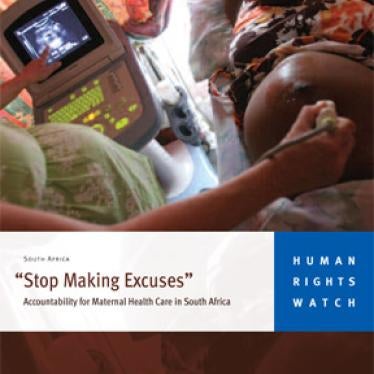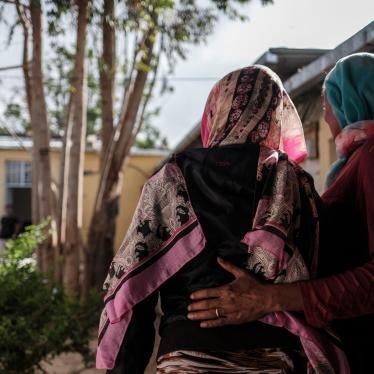(Johannesburg) – A lack of oversight and accountability for recurrent problems in the health system and abuses committed by health personnel contributes to South Africa’s substandard maternity care and undermines one of its top health goals: to reduce its high maternal death rate, Human Rights Watch said in a report released today. South Africa’s maternal mortality ratio has more than quadrupled over the past decade, making accountability structures to improve oversight and correct health system deficiencies all the more critical, Human Rights Watch said.
The 66-page report, “‘Stop Making Excuses’: Accountability for Maternal Health Care in South Africa,” documents maternity care failures that include abuse of maternity patients by health workers and substandard care in Eastern Cape Province, putting women and their newborns at high risk of death or injury. It examines shortcomings in the tools used by health authorities to identify and correct health system failures that contribute to poor maternal health. Eastern Cape has some of the worst health indicators in South Africa, including high infant, child, and maternal mortality rates. But analyses by government and other public health experts show that other regions experience the same problems, including negative attitudes by health workers, poor quality care, administrative and financial management inefficiencies, and lack of accountability for health system failures.
“The government admits that it has a big problem on its hands and wants to do better,” said Agnes Odhiambo, Africa women’s rights researcher at Human Rights Watch. “But for all South Africa’s good intentions, policies and strategies on paper won’t save women’s lives without strong accountability systems to make sure policies are carried out.”
South Africa is unlikely to meet its commitment under the United Nations Millennium Development Goals to reduce maternal deaths by 75 percent between 1990 and 2015. Its maternal mortality ratio increased from 150 deaths per 100,000 live births in 1998 to 625 in 2007, with HIV playing a role in many of the deaths, according to government reports. The UN estimates that 4,500 women die each year in South Africa due to preventable and treatable pregnancy- and childbirth-related causes. South Africa can reverse this trend, Human Rights Watch said.
The report is based on field research between August 2010 and April 2011 with maternity patients, families, community caregivers, health and human rights experts, health workers, government officials, and representatives of donor and international agencies.
A woman living with HIV who delivered at home with near-fatal consequences told Human Rights Watch: “My uncle advised me to call the ambulance when labor started but I did not want to go to the hospital. I was scared of how I would be treated. I hear the nurses are very rude and they are too rough. After giving birth I developed serious problems. I was bleeding too much and I couldn’t breathe properly. Luckily the HIV treatment center took me to hospital, and eventually I got treated.”
Human Rights Watch interviewed women who had experienced physical and verbal abuse at the hands of public health workers, including pinching, slapping, and rough handling during labor. They described treatment delays; nurses who ignored calls for help; and facilities that denied referral letters for pregnancy or childbirth-related problems, left women unattended for long periods after delivery, discharged women inappropriately and sent them home without pain medication or antibiotics, sometimes after Cesarean births, and refused them admission, sometimes without examining them, when they were in labor.
One community caregiver said she witnessed a woman experiencing life-threatening, obstructed labor being rejected from a community health center twice. The woman had an emergency Cesarean section when she finally got care at a hospital.
Women also described widespread verbal abuse. They said that when they sought care for pregnancy, nurses taunted them about enjoying sex or berated them for getting pregnant knowing they were HIV positive, or told them they did not deserve care because they were migrants. Others said nurses ridiculed women when they said they were having labor pains or pleaded for assistance. Some said hospital staff shouted at them for “messing up” when they bled on the floor and ordered them to clean up the blood.
Some women, especially migrants with language barriers, said health workers made little attempt to communicate with them and pressured them to undergo Cesarean sections without informed consent. Others said hospital workers demanded bribes or gifts. Many said that inadequate communication by ambulance dispatchers meant that they could not reach a health facility to give birth. Some families of women or newborns who died, or women who had stillbirths, said they got little or no information about what caused the deaths.
“These abusive practices are a particular concern in South Africa, where almost 87 percent of deliveries are in health facilities,” Odhiambo said.
Mistreatment of maternity patients not only causes unnecessary suffering but also contributes to poor maternal health outcomes, Human Rights Watch said. Ill-treatment drives women away from seeking care. Abuses can lead to delay in diagnosis and treatment, and in turn to increased morbidity and mortality that is more costly to the health system.
Human Rights Watch called on the national and Eastern Cape provincial governments to do more to identify barriers to quality health care and to use that information to strengthen the health system.
The report found that the state fails to provide oversight and accountability for abusive staff and system failures. It said that complaint procedures in the Eastern Cape, which have the potential to address this challenge, do not function properly.
Maternity patients told Human Rights Watch that they knew little about their rights as patients or how to file complaints, and that they hesitated to complain to officers in charge of facilities for fear of retaliation. Others said they had little confidence that their complaints would be investigated and systemic changes made.
Health facilities often fail to respond to complaints or provide redress. Few have quality assurance officers to handle complaints. Some nurses said they worked under such difficult conditions and so are unable to facilitate complaints. These failings contribute to continued mistreatment of maternity patients, shield abusive staff, undermine the public healthcare system as a whole, and stymie progress on improving maternal health care, Human Rights Watch said.
The report identified failure by health authorities to address systemic problems that give rise to complaints, and which contribute to poor maternity care, as the main shortcoming of Eastern Cape’s patient complaint procedures. Some health workers resent the complaints system, seeing it as punitive, and discourage or interfere with patients’ rights to make complaints.
South African health workers indeed work under very trying circumstances, but the challenges they face do not justify abuse or interference with patient complaint mechanisms, Human Rights Watch said. Health workers need support to do their jobs well, and reforms needed to allow them to do so should be informed by patient experiences, the report noted.
The maternity care failures and ineffective complaint mechanisms in Eastern Cape undermine the right to a remedy, under national and international law. They contribute to violations of the rights to life, health, and freedom from cruel, inhuman, and degrading treatment, Human Rights Watch said. The national government and its provinces have a legal obligation to uphold these rights under international and regional human rights treaties.
Human Rights Watch called on the South African national and Eastern Cape provincial governments to condemn physical, verbal, and other abuse of women seeking maternity care, and to take immediate steps to strengthen accountability to ensure women’s right to safe and dignified maternity care. It urged both national and provincial governments to improve complaint procedures to solicit needed information and provide remedies; ensure that health workers are involved in devising strategies to address systemic problems that lead to complaints, and develop systems to assess patterns of complaints and address systemic problems.
“The point of the complaint system is to show that South Africa cares enough about women’s lives to fix the problems,” Odhiambo said. “When accountability and oversight mechanisms don’t function, South Africa is ignoring the insights of the people who know best what’s wrong with maternal health care: the maternity patients themselves.”
Giving Birth Under Abusive Conditions
Abeba M.
Abeba M., a refugee from Ethiopia living in Port Elizabeth, developed severe high blood pressure when 28 weeks pregnant and went to a district hospital for treatment. She soon left because nurses treated her badly, but returned after her condition worsened. Her whole body was swollen and she was in great pain, but a scan for diagnosis and further treatment was delayed 10 days.
On the day of the procedure, she was weak and experiencing blurred vision. “The nurses swore at me and insulted me,” she said. “Now you are saying you are sick and next year you will come with another pregnancy. This is not a place to enjoy or be on holiday.” When she used a cushion for her aching back, she was told to go to a private hospital where she would “be treated like a queen,” and she was ordered to clean up her “mess” when she bled on the floor.
Abeba was afraid that she and her fetus would die. When she called for help one night and said she was in serious pain, a nurse said, “I know, and what do you want me to do?” Abeba said the nurse continued “playing a gospel song on her cellphone and dancing.” Abeba did not complain because she said she did not know to whom to complain or believe the case would be investigated.
Babalwa L.
Babalwa M.’s private doctor referred her to a district hospital for obstetric care because she had serious asthma. But when she went into labor in June 2010, she hesitated to go to the hospital because she feared the nurses would “quarrel me and send me back home without help,” as happened to other women she knew.
After about 12 hours of labor, Babalwa went to the hospital but health staff did not examine her for about an hour and a half. When a nurse finally did examine her, Babalwa said, “The sister said I was lying about being in labor and sent me to the waiting area.” A doctor examined her three hours later, but it was too late. She delivered a stillborn baby. Neither the doctor nor the nurse explained what may have caused the stillbirth.
“I was unhappy about the way I was treated; being told that I was lying about being in labor pain, and being delayed,” she said. “What is still paining me most is that I don’t know what killed my baby.”
“I did not complain to the hospital,” she said. “They say the patient has rights but when you are there [in the hospital] you don’t feel it. People don’t know their rights. You don’t know what questions to ask, or who to ask.”







